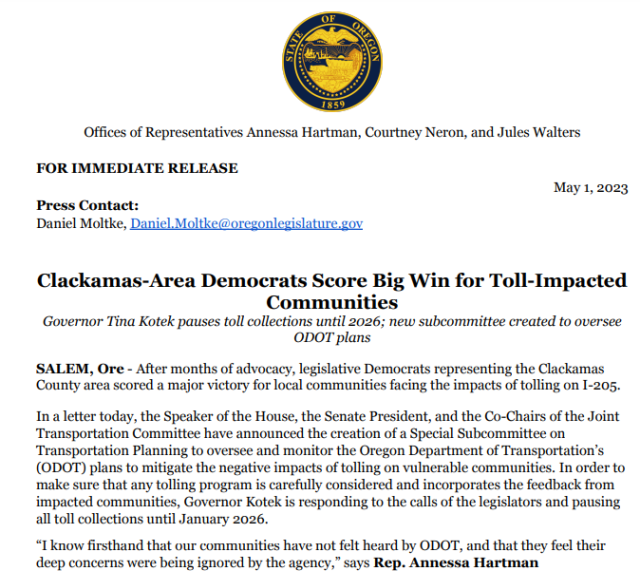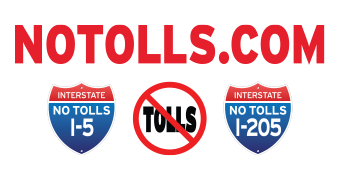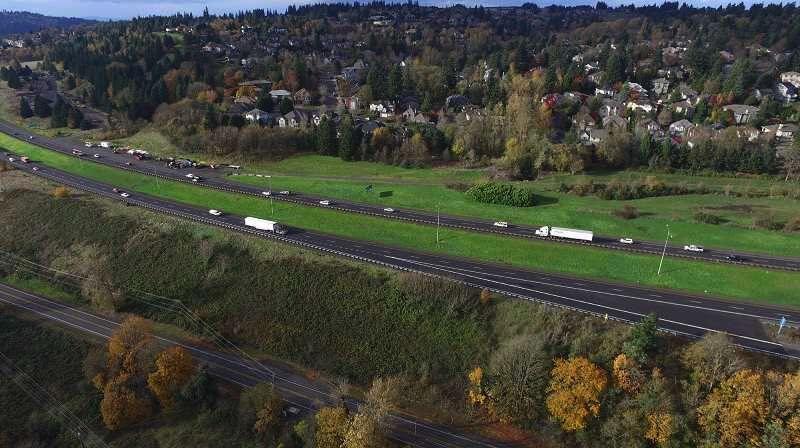Governor follows lead of legislators seeking 2-year pause
By Corey Buchanan May 2, 2023 (Portland Tribune)
Following the bill proposed last week by local legislators calling for a tolling moratorium, Gov. Tina Kotek has apparently initiated the delay herself.
A joint release from Senate President Rob Wagner, D-Lake Oswego, and Oregon House Speaker Dan Rayfield, D-Corvallis, as well as a separate release from Rep. Courtney Neron, D-Wilsonville, Rep. Jules Walters, D-West Linn, and Rep. Annessa Hartman, D-Gladstone and indicated that Kotek had put a pause on tolling until January 2026. However, Pamplin Media Group has not heard back from Kotek’s office.
“Today, we are grateful that our voices are finally being heard loud and clear,” Hartman said in a press release.
The Oregon Department of Transportation had planned for gantries to begin operating on I-205 as early as 2024, with the potential for them to be put in place more broadly — including on I-5 — in 2025.
Along with the pause on implementation, Rayfield and Wagner announced the formation of the Special Subcommittee on Transportation Planning within the Joint Committee on Transportation. This committee will review the planning and implementation of major transportation projects including those pegged to be paid for via tolling such as the I-5 Rose Quarter Improvement Project, the I-205 Improvement Project and the I-5 Boone Bridge replacement project.
“A stable, reliable transportation system that aligns with Oregon’s economic and climate goals is vital to the well-being of Oregon families. The time to repair and modernize our infrastructure is now. As ODOT takes on this important work, the public’s confidence in the state’s ability to provide clear, consistent, and accurate information about the impacts this work will have on our communities is critical,” the release read.
The legislative leaders also expressed support for Kotek’s decision to delay tolling and “trust her ability to balance this pause with the completion of the projects outlined in House Bill 2017.”
Along with countless residents, local leaders from cities like Lake Oswego, Oregon City, West Linn and Wilsonville have consistently criticized the ODOT tolling plan and worried that the process wasn’t addressing impacts to local communities such as diversion onto local streets. Rayfield and Wagner hoped that the committee would engender a deeper consideration of potential altered traffic patterns and the burden on low-income residents. The subcommittee will meet in 2023 and 2024.
“It is important to thoroughly consider whether projects, like planned tolling and the Regional Mobility Pricing Project, are disproportionately impacting certain communities and that any impacts are equitable and mitigated to the fullest extent possible,” the press release read.
Wagner and Rayfield added that tolling is used across the country and is a financial strategy to pay for infrastructure improvements.
The legislators who proposed the bill, including Hartman, Neron and Walters, reiterated their concerns about the impact that tolling could have on local communities and hoped that the delay and committee formation could lead to better solutions.
“Families and local leaders in our communities have been justifiably frustrated with ODOT’s behavior,” Walters said in the release. “This committee will give a voice to those frustrations, and the pause will give us time to ensure the agency hears them.”
“Our communities should not disproportionately shoulder the cost of interstate infrastructure. A flawed tolling program would harm working families, individuals on fixed incomes, and businesses in my community. I don’t believe a toll should divide someone from their own town,” Neron said. “We have an obligation to ensure community voices are heard, legislative sideboards are in place, and that ODOT cannot proceed without truly taking our needs into consideration.”
Mayor Joe Buck, who has consistently raised concerns about the tolling plan, described Kotek’s decision as a “monumental relief” for local communities.
“We’re grateful for our Clackamas legislators who heard the voices of residents all throughout our county and carried those forth to Governor Kotek,” he wrote in a statement. “We look forward now to meaningful engagement on comprehensive transportation funding that will improve local roadways, make our cities safer and help us meet Oregon’s economic and climate goals in a fair and equitable way.”



